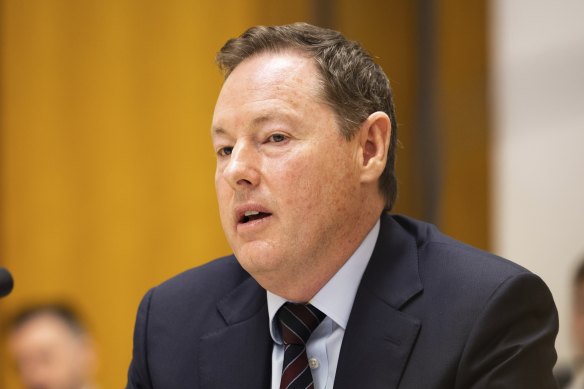
In a country obsessed with punting, why are some of the biggest wagering businesses struggling?
In Australia, where gambling is a popular pastime, major wagering companies are facing challenges. Despite their reputation for being recession-proof, both global industry giants and local stalwart Tabcorp have warned investors of lower returns and a softer market this financial year.
The weak betting market in Australia is driving lower earnings for gambling companies.
Unfortunately for punters, the struggles of these businesses are not due to bookies losing bets. The industry is facing uncertainty due to impending federal changes, increased state taxes, and the rising cost of living.
State of play
Flutter, a $48 billion Irish giant, used to rely heavily on its Australian outfit Sportsbet. However, recent revenue decline has shifted the focus to its US and UK operations. Sportsbet’s revenue fell 18% over the quarter to $502 million, and overall revenue has fallen 7% year on year. Flutter predicts a mid-single digit decline for the 2024 financial year due to increased regulation, a weaker market, and the ban on credit card deposits.

Credit: iStock
Flutter stated that the weak betting market in Australia has led to a lower earnings forecast for the financial year. The company now expects approximately $2.76 billion in earnings before interest, tax, depreciation, and amortisation, which is at the bottom end of its original forecast.
Flutter’s new focus is on its US business, FanDuel, which generated about $150 million more revenue than any other section over the quarter. However, even the booming US market is not enough to fully compensate for the challenges faced by the company, as its London-listed share price has fallen by 20% over the past six months.
It’s not just Australia’s biggest corporate bookmaker, Flutter, that is suffering. ASX-listed Tabcorp and LSE-listed Entain have also reported weakened trading conditions in Australia. Tabcorp’s revenue has fallen by over 6% for the first quarter of 2024, and Entain stated in September that its local revenue had slumped by high single digits.
Tabcorp’s share price has declined by 35% over the past six months to 74¢, while Entain’s shares have slumped by 39% to $16.44.

Tabcorp chief executive Adam Rytenskild.Credit: Alex Ellinghausen
Tabcorp managed to record a $66 million profit in 2023, making it the only local wagerer to increase its earnings over the year.
The role of COVID-19 lockdowns
The decline in share prices across the industry can be attributed, in part, to the normalization following the end of COVID-19 lockdowns. While most wagering executives have been hesitant to admit that the pandemic benefited their turnover, customer engagement soared in 2020. This is evident in the share price curves of major wagering businesses, including Flutter, Entain, Tabcorp, and PointsBet, which all experienced a surge after the initial shock of the lockdown in March 2020.
According to data released by the Australian Institute for Family Studies, the proportion of people gambling four or more times a week increased from 23% to 32% during the 2020 lockdowns, despite restricted access to physical venues and a decrease in the number of sports games being played. The data also revealed that almost one in three people surveyed signed up for a new online betting account, and one in 20 began gambling online for the first time.
Flutter attributed Sportsbet’s 14% decline in revenue to “lower levels of player engagement compared to the prior year when more than 60% of the country was in lockdown.” They also mentioned that weather-related racing disruption had dampened turnover.
Regulatory uncertainty persists
The major obstacle facing the local market is ongoing uncertainty surrounding impending federal changes. The House of Representatives standing committee on social policy and legal affairs issued 31 recommendations following an extensive inquiry into online gambling harm this year.
The most publicized recommendation in the report is the ban on gambling advertisements within three years, which has significant financial implications for wagerers, major sporting codes, and media companies. However, wagering executives are more concerned about a potential ban on inducements such as bonus bets and deposit matches, which are key ways to attract punters.
The government was expected to respond to the recommendations earlier this month but has not yet done so. Communications Minister Michelle Rowland stated that it is important to get the policy settings right and hinted that an outright ban on gambling advertising is unlikely, but harm minimization principles will guide their decisions.
The government has already banned the use of credit cards for online wagering and launched the long-awaited self-exclusion register, Betstop. In its first three months of operation, approximately 13,000 people have used the service, with 40% choosing to ban themselves for life.
In October, it was revealed that government officials had been consulting industry stakeholders about limiting the frequency of advertisements on TV and radio rather than banning them altogether.
While poker machines remain the biggest cause of gambling harm in Australia, with most problem gamblers having machine-related addictions, many gambling-harm experts argue that gambling advertisements can encourage young people and those with existing gambling problems to engage in betting when they would otherwise abstain.
About the Author
Amelia McGuire is the aviation, tourism, and gaming reporter at The Sydney Morning Herald and The Age. Connect with her via Twitter or email.
Conclusion
The Australian gambling industry is facing challenges due to various factors such as federal changes, increased state taxes, and the impact of COVID-19 lockdowns. Major wagering companies like Flutter, Tabcorp, and Entain have experienced declines in revenue and share prices. The uncertain regulatory landscape adds to the industry’s struggles. While the pandemic initially boosted customer engagement, the normalization after lockdowns has affected turnover. The government is considering recommendations to address gambling harm, including potential bans on advertisements and inducements. The future of the industry remains uncertain, and stakeholders are closely watching for government responses and policy decisions.
Connect via Twitter or email.
Most Viewed in Business

George Barham, an accomplished journalist and avid gambling enthusiast, serves as the esteemed Editor-in-Chief at fly-to-australia.com, Australia’s leading source for comprehensive gambling news and insights. With an unwavering passion for both the written word and the ever-evolving world of betting and gaming, George brings a wealth of knowledge and expertise to the helm of our editorial team.



